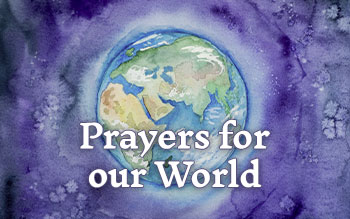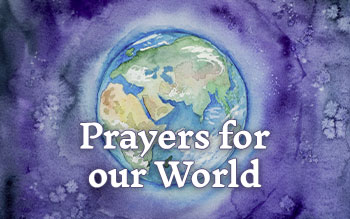Displaying items by tag: United Nations
Gaza: Israel using starvation as a weapon?
A UN-backed report has revealed that Gaza is facing a man-made famine, prompting pressure on Israel to uphold its legal obligations by allowing sufficient humanitarian aid into the region. The UN's human rights chief suggested Israel may be using starvation as a weapon of war - potentially a war crime. Israeli officials deny this accusation, claiming that they are letting in all the aid offered by the US and the rest of the world. However, the huge backlog of aid lorries at the Egypt-Gaza border has forced some nations to use less efficient air drops. Palestinians have struggled to access aid; some have even drowned or been crushed in pursuit of supplies. The US navy plans to construct a temporary pier for sea delivery, highlighting the necessity of better access routes. In another development, on 25 March the UN Security Council voted for an immediate ceasefire; for the first time, the USA abstained rather than vetoing the resolution. See
Gaza conflict: UN vote for an immediate ceasefire
On 12 December, the UN General Assembly overwhelmingly passed a resolution calling for an immediate ceasefire in the Israel-Hamas conflict. With 153 votes in favour, 10 against (including the United States and Israel), and 23 abstentions (including the UK and Germany), the resolution emphasises the need to protect civilians and civilian infrastructure, provide humanitarian assistance, and seek a peaceful resolution to the ongoing conflict. It also calls for an end to the use of force and the resumption of negotiations. It is reported that the conflict has now led to over 18,600 civilian casualties in the Gaza strip, 70% of them women and children. The vote serves as a strong international call for an end to hostilities and a return to peace talks. On 8 December, an almost identically worded resolution proposed at the UN security council was vetoed by the USA. There is a sense that Joe Biden’s administration is becoming increasingly isolated in its unconditional support of Israel’s actions.
Global: Tearfund action in Paris
Next week Tearfund staff and campaigners from communities most affected by plastic pollution will be in Paris for the second round of negotiations on a UN global plastics treaty. The talks - known as INC-2 (Intergovernmental Negotiating Committee) - will run from 29 May to 2 June and mark a significant moment in a rubbish campaign. Tearfund is asking Christians to pray for the negotiations. Recent research showed that across the world 218 million people (equivalent to the populations of the UK, France and Germany combined) are at risk of flooding made worse by plastic pollution. At the talks, Tearfund will be calling for an ambitious and binding treaty that fully addresses plastic pollution and the impact it has on people living in poverty. It believes every person God created has value and should have the opportunity to live a full life, free of rubbish
Ukraine / Russia: grain Initiative
The Russian invasion of Ukraine, a major exporter of grain, led to the blocking of all grain shipments until an agreement called the Black Sea Grain Initiative was signed in Istanbul between Ukraine, Russia and the UN. This agreement will expire on 19 November unless renewed. Renewal negotiations were being facilitated by the UN throughout October until the 29th, when a drone attack on Russian naval ships prompted Russia to suspend participation. Talks resumed on 2 November, with hopes to extend the agreement for a year. On 17 November Ukraine’s minister of infrastructure said the initiative would be prolonged, but only for 120 days.
New York: UN General Assembly
The 77th session of the UN General Assembly opened on 13 September 2022, with a high-level debate running from the 20th to 26th. This year’s theme, ‘A watershed moment: transformative solutions to interlocking challenges’, acknowledges the shared roots of crises such as Covid-19, climate change and conflict, and the need for solutions that build global sustainability and resilience. Like all crises, these have unique and disproportionate impacts on women and girls. From harsher economic fallout to heightened risk of violence, women and girls are suffering in specific ways that require targeted solutions - a need that too often remains unmet. These crises are unfolding against the backdrop of a global backlash on women’s rights, compounding forces that threaten to undo already insufficient progress. Pray for this session to generate more action towards achieving gender equality and the empowerment of all women and girls around the world.
Global: hunger - no time to lose
Hunger is stalking the world. In 2017 the UN vowed to eradicate it by 2030. Yet the number of people affected globally reached 828 million last year, and an unprecedented 345 million are currently experiencing acute food insecurity. Since May 2020 there has been a 55% increase in the food price index. The head of the World Food Programme said, ‘We thought it could not get any worse’ - but the Ukraine war has worsened freight and fertiliser costs due to rising fuel prices, and has blocked ports. Ukraine and Russia previously accounted for almost one-third of global wheat exports. Many middle-income countries have spent large parts of their reserves due to the pandemic. Even in wealthier countries, more parents are going hungry to feed their children. In low-income countries rising prices are deadly. Around 2.3 billion people face moderate or severe difficulty obtaining enough to eat, which could result in social unrest and political violence.
Global: food shortages
The world is in a critical hunger situation. The global prevalence of moderate or severe food insecurity in 2020 was equal to the previous five years combined. Nearly one in three people globally (2.37 billion) did not have enough food in 2020. Moderate or severe food insecurity affects over 30% of the world. Covid-19 had a devastating impact on the global economy, triggering an unprecedented recession not seen since the Second World War, and the food security and nutrition status of millions of people, including children, will deteriorate if we do not take swift action. We can pray for God to inspire united humanitarian and peacebuilding policies in conflict-affected areas that will ease blockages to food distribution and develop avenues of safe transit of all aid. Pray for the UN to intervene in food supply chains so that costs of nutritious foods are lowered.
Afghanistan: Al-Qaeda still 'heavily embedded' within Taliban, UN official warns
Al-Qaeda is still "heavily embedded" within the Taliban in Afghanistan, in spite of a historic US-Taliban agreement earlier this year, a senior United Nations official has told the BBC.
Earlier this year, the US signed an agreement with the Taliban committing to withdrawing all American forces from the country by next summer if the Taliban ensured groups including al-Qaeda were not able to use Afghan territory to plot international attacks.
But Edmund Fitton-Brown, co-ordinator of the UN's Islamic State, Al-Qaeda and Taliban Monitoring Team, has told the BBC that the Taliban promised al-Qaeda in the run-up to the US agreement that the two groups would remain allies.
"The Taliban were talking regularly and at a high level with al-Qaeda and reassuring them that they would honour their historic ties," Mr Fitton-Brown said.
He said the relationship between al-Qaeda and the Taliban was "not substantively" changed by the deal struck with the US. "Al-Qaeda are heavily embedded with the Taliban and they do a good deal of military action and training action with the Taliban, and that has not changed," he said.
Eliminating the threat from al-Qaeda and overthrowing the Taliban regime that had harboured them was the original basis for the US invasion of Afghanistan, following the 9/11 attacks. At the time, President George W Bush vowed to hunt the militants until there was "no place to run, or hide, or rest".
Al-Qaeda's strength and ability to strike the West has significantly diminished over the past decade, but its leader Ayman al-Zawahiri is believed to still be based in Afghanistan along with a number of other senior figures in the group. The Afghan intelligence services announced on Saturday they had killed Husam Abd al-Rauf, a high ranking Egyptian al-Qaeda member, in an operation in Ghazni province. Mr Fitton-Brown told the BBC that despite its lower profile, al-Qaeda remained "resilient" and "dangerous".
How the Taliban's relationship with al-Qaeda develops could determine the future of the Afghan peace process. The Taliban's commitments on international terrorism are the most tangible demands that need to be met as part of the US-Taliban withdrawal agreement. However, the issue is likely to prove divisive, with Taliban hardliners thought to oppose any measures cutting their links with al-Qaeda.
It is feared the Afghan peace process is in any case losing its momentum. Despite the beginning of long delayed negotiations between the Taliban and an Afghan government-led delegation last month in Qatar, violence has continued and even intensified in recent weeks.
The negotiations have stalled amid attempts to resolve preliminary issues, with major issues such as a ceasefire or power-sharing arrangement yet to be discussed. There are fears that if US troops are withdrawn next year, before an agreement has been reached, the violence could intensify and the Taliban push for a military victory.
Mr Fitton-Brown warned that, were the peace process to fall apart, al-Qaeda and the Islamic State group could attempt to further exploit "ungoverned space" in Afghanistan.
"Both of those groups have an avowed aspiration to pose an international threat," he said.
More at: https://www.bbc.co.uk/news/world-asia-54711452
Extracts from an email received from a humanitarian organization serving the people of Afghanistan:
Dear Brothers and Sisters,
While the Taliban are in Doha now since one month to presumable talk about peace with high officials of the Afghan government, the fighting continues unabated and yesterday the Afghan Ministry of Interior (MoI) reported that 180 civilians have been killed and 375 have been wounded over the last month in a spate of violence across Afghanistan.
Many Afghans were expecting that a cease fire would be announced or fighting would slow down, but the Taliban have increased their attacks on the government, Army, police and civilians throughout the country.
“Where is peace? Which peace? While we are going to Doha for talks, you witness a wave of suicide attacks, there are explosions, soldiers are being killed - we do not need this kind of peace,” said Najibullah Kabuli.
Fighting was also reported close to the capital and to the city where our team from the North East is based and also in the west of the country fighting has increased and many other parts. The Taliban try to get into a stronger position as they negotiate with the government.
Please pray that the Taliban would be pushed back and defeated and they would not make any further success!
Please continue to pray also for the so-called peace talks in Doha/Qatar.
The Taliban will definitely try to get a big influence on the present government which could really change the society again into strict Sharia rules.
Please continue to pray for all our foreign and local workers and brothers and sisters for their protection.
Afghanistan: Covid Crisis amidst increasing attacks
This prayer update is based on input from a contact of IPC’s who is living in the region…
Thank you for your faithful prayers for Afghanistan.
COVID-19 spreads like wildfire and it looks like the whole country is penetrated by this virus. We received reports that it has now reached the mountainous areas whereas it was mostly contained in the larger cities.
Many people are dying because of lack of medical facilities. People are poor and cannot afford to buy oxygen cylinders. A big number of brothers and sisters, expats and locals have become quite seriously ill. Some are also suffering from tiredness, anxiety and depression.
Deborah Lyons, Head of the United Nations Assistance Mission in Afghanistan (UNAMA), told the Security Council on Thursday that the novel coronavirus outbreak is casting “a huge shadow” over Afghan daily life. Under the leadership of the Afghan government, the United Nations is supporting a coordinated response that includes setting up a nationwide network of laboratories and the provision of personal protective equipment, she said.
Pray that the desperately needed medical aid will reach as far as the rural hospitals and clinics. Pray that sufficient oxygen can be supplied to relieve the suffering of all of the patients, regardless of circumstances.
The other great challenge is the strong attacks of Talibans and ISIS against the army and police. They killed and wounded over 400 soldiers in one week. The National Security Council called it the bloodiest week in 19 years. https://aje.io/q3gru
Please continue to pray for an end of the fighting and that the Taliban and ISIS movements would come to an end. Despite these attacks, the U.S. government is committed to withdraw their troops.
Pray that Afghans in their great desperation would call on the Name of the Lord and will encounter and start to follow Him.
Pray also for continued boldness for those in the country to witness and share the gospel.
Sayed Mukhtar 13, an Afghan teenager who was trained by the Taliban for a suicide attack, has surrendered to the Afghan security forces in Kunduz province, the Ministry of Interior said on Thursday.
The teenager claimed that he spent five years in a Taliban camp and pursued military education and tactics for suicide attacks. Sayed Mukhtar was due to detonate explosives strapped to his body in a marriage gathering two days ago, but he changed his mind and surrendered to the Afghan security forces.
“This is one of the examples of how the Taliban has resorted to such brutal acts over the past decade-and-a-half. they could have devastated tens of youngsters and youths,” said Tariq Aryan, a spokesman for the Ministry of Interior.
Pray that these despicable attacks will be stopped in their tracks and for the youngsters who have been brainwashed – that they will reject the instructions to cause devastation and the loss of innocent lives, like Sayed did.
UN Article More: https://news.un.org/en/story/2020/06/1067162
Syria: Top UN officials report ‘shocking’ scale of suffering
The UN chief called on the world to step up “financial, humanitarian and political commitments”, to help end nearly a decade of brutal conflict and suffering across Syria, in a video message delivered to the fourth Brussels Donor Conference on Tuesday.
“After nearly a decade of war and economic hardship, the scale of suffering remains shocking”, said Secretary-General António Guterres.
The conference received pledges of $5.5 billion in funding, to support humanitarian, resilience and development activities in 2020, and $2.2 billion for crisis response in 2021 and beyond. In addition, multilateral development banks and bilateral donors pledged up to $6.7 billion in loans.
Hundreds of thousands of people have been killed; half the pre-war population, or over 12 million Syrians, are displaced, including 5.6 million who fled the country; millions are going hungry or are malnourished; and 90 per cent of the population lives in poverty.
And all of this is being further compounded by the coronavirus.
UN in solidarity
Currently over 11 million Syrians need emergency assistance just to survive, many of whom rely solely on the UN and its humanitarian partners. “We provide life-saving food, healthcare, sanitation facilities, education and protection services, to millions of Syrians every month”, the UN chief said. “We help to address their trauma and provide legal advice so they can start to rebuild their lives” – all of which depends on “generous” donor support.
Since only “a political solution can end the suffering in Syria”, he urged “all those with influence” to help Syrians find common ground.
Downward spiral
Emergency Relief Coordinator Mark Lowcock noted that the Syrian crisis is “approaching the length of the combination” of the two World Wars, as it wreaks havoc and acute economic strain across the region.
He painted a gloomy picture of the Syrian economy in “a dramatic downturn” with prices of essential food, medicines and fuel “soaring” as the Syrian pound “fell to a record low against the US dollar this month”.
The UN official cited estimates from the World Food Programme (WFP) in revealing that an “unprecedented level” of 9.3 million people there are food insecure and almost half a million children suffer from stunting, a consequence of malnutrition.
“And now we have COVOID-19, which has the potential to cause much more suffering and loss, with preparations to tackle it inside Syria wholly inadequate in the light of the degrading of the health system through the years of crisis”, added the humanitarian coordinator.
Mr. Lowcock elaborated on how the UN was supporting the situation on the ground, including by providing food assistance to more than 3.2 million people; nutrition support for half a million children; critical water and sanitation for 1.3 million people; and four million medical procedures.
“The humanitarian assistance we provide across Syria and in the region depends on the generous support of the States and constituencies represented here”, he flagged.
Stolen educations
Noting that “one of the most tragic consequences of the horror story of the last decade has been the robbing of millions of children of their right to a decent education”, he foresaw major long-term consequences, “for more than fifty years”.
“One of the major challenges is funding”, Mr. Lowcock said and asked donors to prioritize pledges to the education of these children, saying it is “in your own interests, but most importantly in theirs”.
‘Unlocking’ a political process
Syrian Special Envoy Geir O. Pedersen reiterated his call for “a nationwide ceasefire”, along with the need to be vigilant about COVID-19, the importance of resolution 2254, which calls for a ceasefire and political settlement, and the challenges posed by groups listed as terrorists by the Security Council.
Moreover, he again appealed for the Syrian Government and other parties to “carry out large-scale, unilateral releases of detainees and abductees, and meaningful actions on the missing persons”. Mr. Pedersen expressed his hope that the Syrian-led, Syrian-owned Constitutional Committee facilitated by the UN in Geneva “will be able to meet on a regular basis throughout the rest of the year”.
Acknowledging that a constitutional discussion would not address the full range of dire realities Syrians grapple with, he maintained that the Committee’s work can be “a door-opener to unlock a broader political process”
Pray: For a negotiated ceasefire and a political settlement.
Pray: With thanks for the pledges of loans and donations to support the humanitarian aid, education and covid-19 relief efforts. May further funds be released to scale up all of these initiatives.
Pray: for the organisations delivering the aid and medical assistance, for protection, good health and free access to those who need their help.
Pray: For the many people who have been displaced by this war, that they will find safe refuge amidst the challenges and hardships.
Pray: for the UN and countries with influence, that they will bring about lasting peace to Syria and the region.









